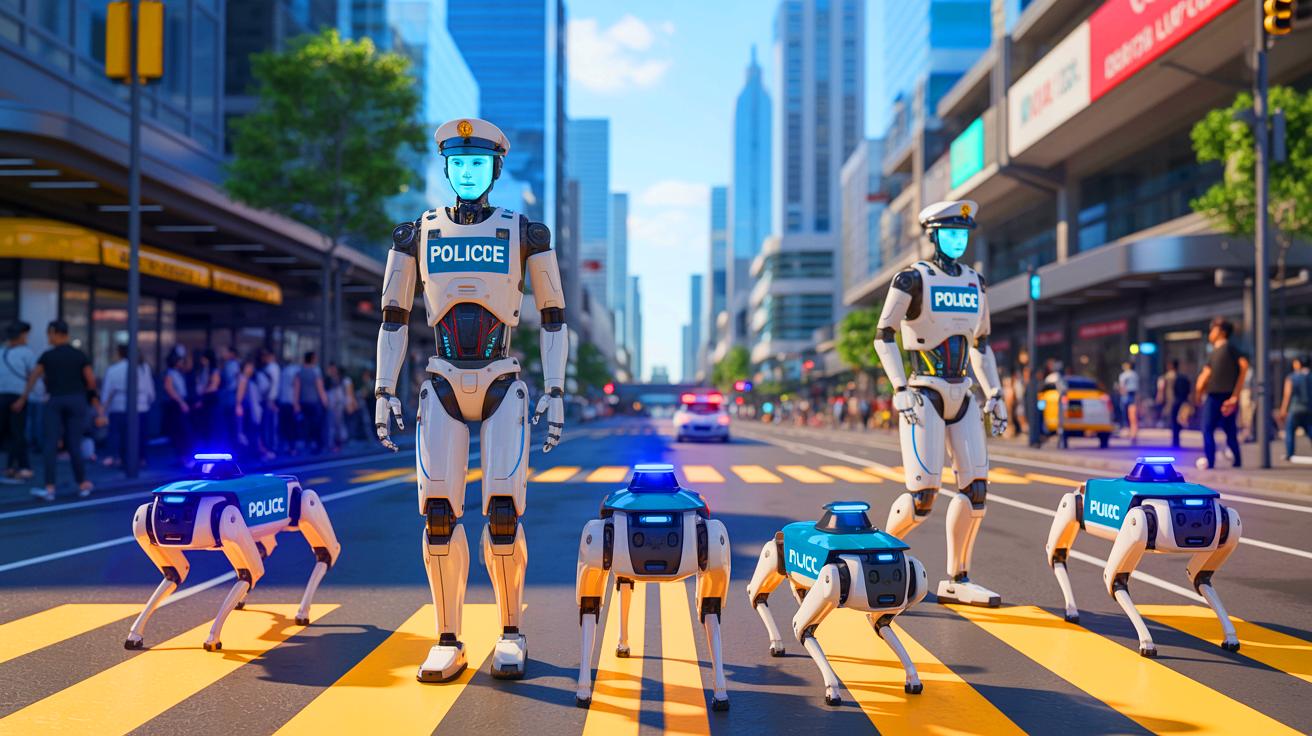In an unprecedented leap into the future of law enforcement, Indonesia has introduced humanoid police robots to patrol its streets, hunt down criminals, and take on the country’s relentless war against drug trafficking. What was once science fiction is now reality, as these AI powered robotic officers hit the ground to support human police in one of Southeast Asia’s toughest security environments.
The world has watched with fascination and concern as Indonesia deploys these futuristic machines. But behind the headlines, what does this mean for crime prevention, civil liberties, and the very nature of policing? Let’s dive deep into the evolution, implications, and real world impact of Indonesia’s bold RoboCop style experiment.
The Rise of Humanoid Police Robots: Indonesia’s Bold Step
Indonesia’s ambitious project comes after years of grappling with rampant drug trafficking, organized crime, and street violence. Authorities claim that humanoid police robots will help enhance surveillance, enforce laws more effectively, and deter criminal activity in high risk zones.
These robotic officers are equipped with cutting edge AI, facial recognition, language processing, and autonomous navigation. They can identify suspects patrol crowded areas, and even communicate with civilians. But unlike traditional surveillance tools these robots mimic human appearance and behavior, making their presence both futuristic and slightly unsettling.
The capital city of Jakarta has become the testing ground for these robots. In early trials the humanoid police robots were deployed in busy public spaces, transportation hubs, and known drug hotspots.
Initial reports from Jakarta’s Metropolitan Police indicate a noticeable reduction in street level drug transactions and petty crimes within the robot patrolled zones. Local authorities claim the robots’ constant presence deters criminal activity and enhances public safety, though some human rights groups remain skeptical.
A Double Edged Sword
Leading robotics experts and law enforcement analysts have expressed mixed views on Indonesia’s use of humanoid police robots. Dr. Siti Mulyani, a robotics engineer at the Bandung Institute of Technology, views the project as “a groundbreaking integration of AI in public security,” but warns of ethical challenges.
Robots can patrol tirelessly, collect data efficiently, and reduce human error” Dr. Mulyani explains. “However! without strict regulations, we risk infringing on privacy, misidentifying individuals, or even creating a false sense of security.”
Meanwhile, legal experts caution that the deployment of robotic law enforcement raises unanswered questions about accountability. Who is responsible if a humanoid police robot wrongfully detains someone? What safeguards prevent misuse or hacking?
Public Reaction on the Ground
Among Jakarta’s residents, reactions to the humanoid police robots are mixed. Some embrace the technological leap, while others feel uneasy.
Fauzi, a 34 year old shopkeeper near Monas, Jakarta’s iconic National Monument, says the robots have made the area feel safer. Before the robots, this area was full of pickpockets and drug peddlers” Fauzi shares. “Now! you can feel their eyes on you. I see fewer shady characters hanging around.
Conversely university student Putri expresses concern over constant surveillance. It feels like Big Brother is always watching she says. “I understand the need for security, but I don’t want to be monitored every time I walk to class.”
Benefits and Concerns of Robotic Policing
There’s no doubt that humanoid police robots offer unique advantages:
24/7 Patrols: Unlike human officers, robots don’t need breaks, making them ideal for continuous monitoring.
Non Biased Enforcement: AI removes human prejudices at least in theory.
Data Collection: High resolution cameras and sensors gather vast amounts of intelligence in real time.
Reduced Risk to Officers: Robots can be deployed in dangerous situations, reducing harm to human personnel.
However! the concerns cannot be ignored:
Privacy Invasion: Constant surveillance raises fears of a surveillance state.
AI Bias: If AI systems are trained on flawed data they may replicate biases.
Job Displacement: Some fear robots could replace human jobs in law enforcement.
Technical Vulnerabilities: Robots connected to the internet are susceptible to hacking.
These concerns echo global debates, as countries like the UAE, Singapore, and China also experiment with humanoid police robots for public security tasks.
Are We Entering the RoboCop Era?
Indonesia is not alone in turning to robotics to address crime and public safety. Dubai has deployed police robots to assist with tourist inquiries, issue parking tickets, and patrol malls. Similarly, Singapore uses autonomous patrol robots in housing estates.
However Indonesia’s deployment marks a significant escalation specifically targeting drug trafficking and criminal networks. This move signals a shift from passive, assistive robots to active enforcement roles a development that many see as the beginning of a global RoboCop reality.
The Future of Humanoid Police Robots
The deployment of humanoid police robots in Indonesia has ignited global debate. While the technology promises to enhance law enforcement efficiency and reduce crime it also raises ethical, legal, and social questions that demand careful consideration.
Indonesia’s success or failure with this initiative will likely shape how other nations approach AI driven policing. As the world watches closely, one thing is certain: the line between science fiction and reality is rapidly blurring and the future of law enforcement may look more robotic than ever before.


1 thought on “Indonesia Deploys Humanoid Police Robots | Crime & Drug Mafia’s Worst Nightmare Begins”